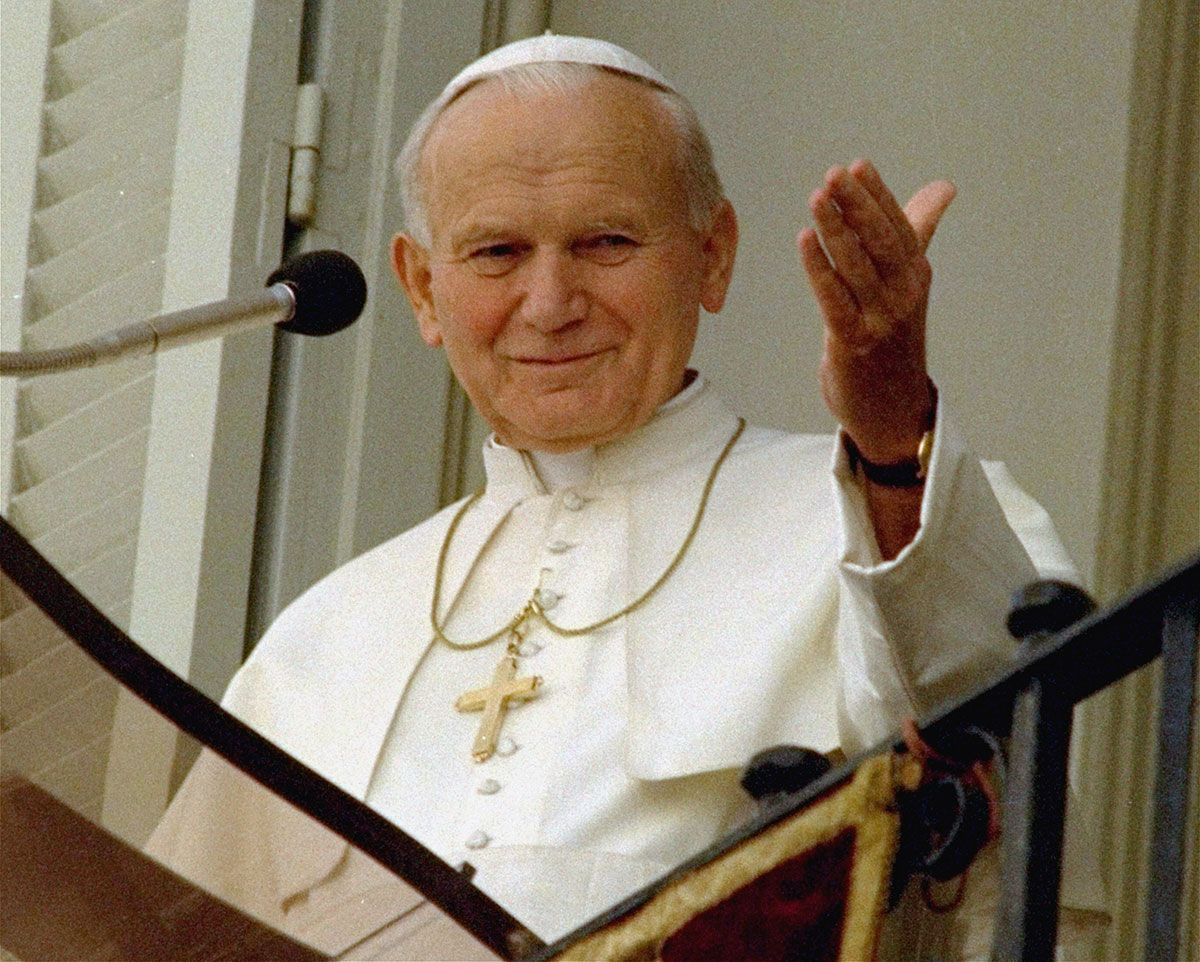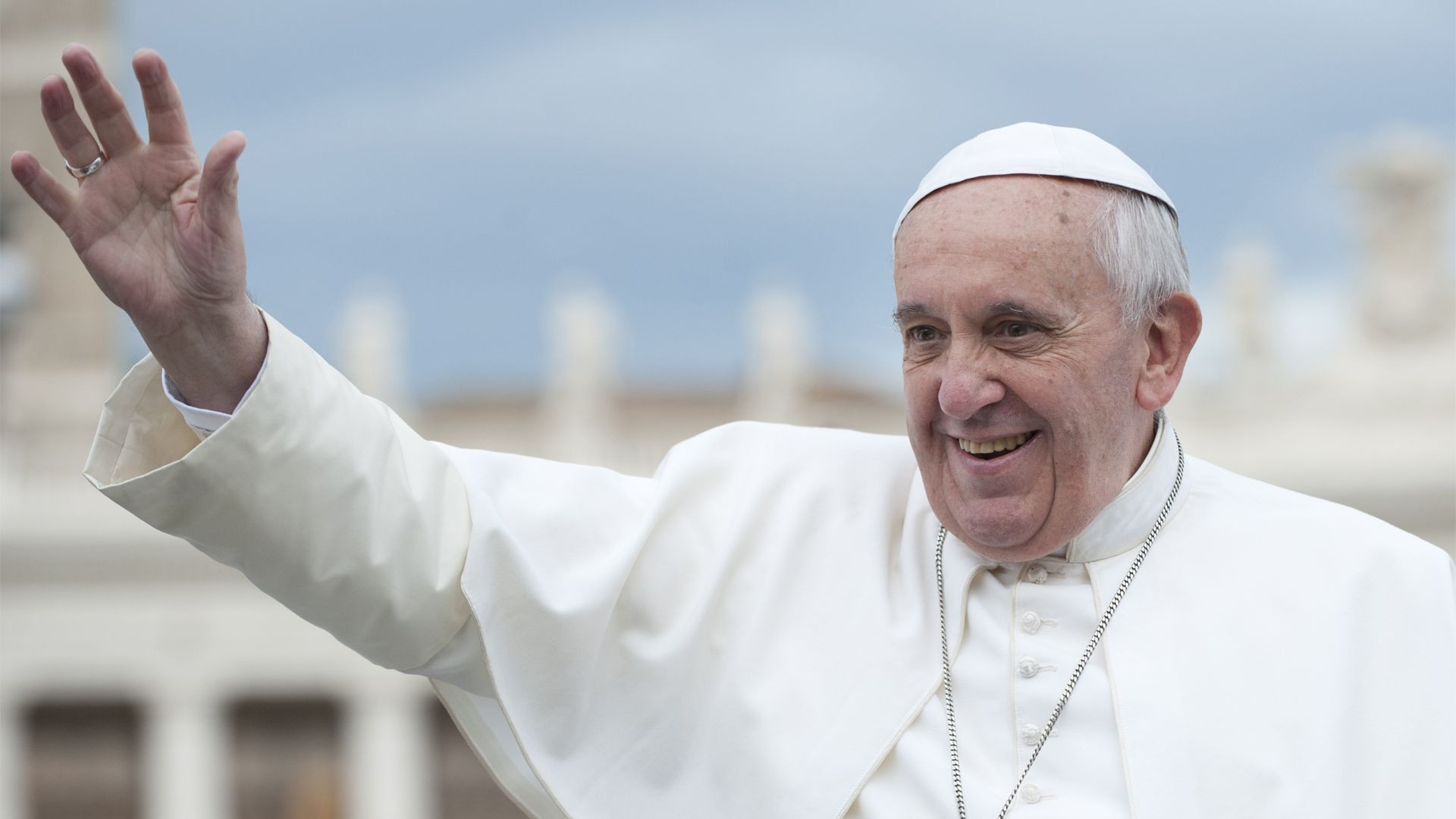John Paul Ii, born Karol Józef Wojtyła, remains one of the most influential figures of the 20th and early 21st centuries. Serving as Pope from 1978 to 2005, his pontificate was the third longest in the history of the Catholic Church and profoundly shaped not only the Church but also global politics and interfaith relations. As the first non-Italian Pope in over four centuries and the first Slavic Pope, John Paul II brought a unique perspective to the papacy, marked by extensive international travel, a commitment to human rights, and a deep engagement with the modern world.
 Pope John Paul II waving to pilgrims, September 10, 1989
Pope John Paul II waving to pilgrims, September 10, 1989
Early Life and Influences of Karol Wojtyła
Karol Wojtyła’s early life in Wadowice, Poland, was formative. Born on May 18, 1920, his childhood was framed by Poland’s brief interwar independence, a fragile freedom soon to be overshadowed by the horrors of World War II. Growing up in a town with both Catholic and Jewish communities, Wojtyła experienced a relatively harmonious environment, fostering early lessons in tolerance and understanding. His father, Karol Wojtyła Sr., a Polish Army lieutenant, instilled in him discipline and a strong sense of patriotism. The early loss of his mother, Emilia Kaczorowska, and his brother Edmund deeply impacted young Karol, shaping his spiritual journey and resilience.
Wojtyła excelled academically and showed a passion for theatre and sports, particularly football. His move to Kraków for university coincided with the Nazi invasion of Poland in 1939, abruptly ending his formal studies and plunging him into the heart of wartime resistance. This period of occupation deeply influenced his worldview. Witnessing Nazi atrocities and the suppression of Polish culture fueled his commitment to human dignity and national identity.
During the Nazi occupation, Wojtyła worked in a quarry and then a chemical factory to avoid deportation. Simultaneously, he engaged in clandestine cultural activities, joining the Rhapsodic Theatre, an underground resistance group dedicated to preserving Polish culture through poetry and drama. This involvement in underground cultural resistance alongside his introduction to the mystical teachings of St. John of the Cross through Jan Tyranowski, a lay apostle, further solidified his spiritual path and his conviction in the power of faith and culture to overcome oppression.
Path to Priesthood and Early Ministry
The death of his father in 1941 was a turning point for Wojtyła, deepening his spiritual introspection and solidifying his decision to enter the priesthood. In 1942, he began studying in secret underground seminary classes run by Cardinal Adam Sapieha, Archbishop of Kraków. Hiding from Nazi roundups, he spent the latter part of the war in the Archbishop’s Palace, disguised as a cleric. This direct experience of wartime suffering and the persecution of priests reinforced his calling and provided a profound understanding of the priesthood’s role in times of crisis.
After the war, with Poland under Soviet influence, Wojtyła was ordained a priest in November 1946 by Cardinal Sapieha. His first mass in Wawel Cathedral’s crypt, surrounded by Polish national heroes, symbolized his deep connection to Polish history and his aspirations for national and spiritual liberation. He pursued further studies in Rome, earning a doctorate in theology focused on St. John of the Cross. Returning to Poland in 1949, he served as a parish priest and engaged in extensive academic work, teaching theology and ethics at Jagiellonian University and later at the Catholic University of Lublin.
 How is a pope elected?
How is a pope elected?
During this period, Father Wojtyła was not only an intellectual and spiritual leader but also a mentor to young adults. He led a close-knit group on kayaking and camping trips, fostering deep friendships and exploring theological and philosophical ideas in informal settings. His book Love and Responsibility (1960), explored Catholic teachings on sexuality and marriage in a progressive manner, reflecting his engagement with contemporary issues and his pastoral approach. This combination of intellectual rigor, pastoral dedication, and engagement with modern issues marked him as a rising figure within the Catholic Church.
Ascent to the Papacy and Transformative Pontificate
Wojtyła’s dynamism and effectiveness as a pastor and intellectual led to rapid advancement within the Church hierarchy. In 1958, Pope Pius XII appointed him Auxiliary Bishop of Kraków. His participation in the Second Vatican Council (1962-1965) was pivotal. He contributed significantly to key documents on religious freedom and the Church in the modern world, demonstrating his theological acumen and his vision for a Church actively engaged with contemporary society. In 1963, Pope Paul VI appointed him Archbishop of Kraków, recognizing his growing influence and leadership within the Polish Church and the global Catholic community.
Following the death of Pope John Paul I after a very short reign, Cardinal Wojtyła was elected Pope on October 16, 1978, taking the name John Paul II. This election marked a historic turning point. As the first non-Italian Pope in centuries, he symbolized a shift towards a more global and inclusive Church. His papacy was characterized by several defining features:
Global Evangelization and Travel: John Paul II became the most traveled Pope in history, visiting over 129 countries. These journeys were not merely ceremonial; they were strategic missions of evangelization, interfaith dialogue, and solidarity. He used mass media effectively to reach billions, becoming a global spiritual leader whose voice resonated beyond the Catholic Church.
Champion of Human Rights and Freedom: Having lived under both Nazi and Communist regimes, John Paul II was a staunch advocate for human rights and religious freedom. His unwavering support for the Solidarity movement in Poland is widely credited with contributing to the fall of communism in Eastern Europe. He consistently spoke out against political oppression and injustice worldwide, becoming a moral compass for global political discourse.
Interfaith Dialogue and Reconciliation: John Paul II made unprecedented strides in interfaith relations. He fostered closer ties with Judaism and Islam, issuing apologies for historical wrongs committed by Catholics and seeking common ground for peace and understanding. His meeting with Jewish leaders in a synagogue and his visit to the Western Wall were groundbreaking events, symbolizing a new era of Catholic-Jewish relations. Similarly, his outreach to Muslim leaders and his emphasis on shared values promoted interreligious understanding and cooperation.
Social and Moral Teachings: John Paul II upheld traditional Catholic teachings on sexual morality and social issues. He reaffirmed the Church’s opposition to artificial contraception (Humanae Vitae) and abortion while emphasizing the dignity of human life and the importance of social justice. His encyclicals, such as Centesimus Annus and Evangelium Vitae, offered profound reflections on economic justice, human dignity, and the moral foundations of society.
Internal Church Reforms and Centralization: While promoting dialogue with the world, John Paul II also centralized authority within the Vatican. He reinforced traditional doctrines and exercised firm control over theological discourse and appointments within the Church. This approach, while ensuring doctrinal consistency, also faced criticism from those who sought greater decentralization and reform within the Church’s structure.
Legacy and Sainthood of John Paul II
The legacy of John Paul II is immense and multifaceted. He revitalized the papacy, transforming it into a globally recognized moral authority. His emphasis on human dignity, religious freedom, and interfaith dialogue left a lasting impact on global politics and religious relations. He is credited with playing a significant role in the fall of communism and inspiring democratic movements worldwide. Within the Catholic Church, he strengthened its global presence and reaffirmed core doctrines while facing challenges related to secularization and internal dissent.
John Paul II’s pontificate was not without its challenges and criticisms. His conservative stance on certain social issues alienated some Catholics, and the Church faced growing scandals related to clerical sexual abuse during his later years. Nevertheless, his profound impact on the Church and the world is undeniable.
 Pope John Paul II waving to pilgrims, September 10, 1989
Pope John Paul II waving to pilgrims, September 10, 1989
Following his death on April 2, 2005, there was widespread calls for his canonization. He was beatified in 2011 and canonized as a saint in 2014. St. John Paul II is remembered as a transformative figure, a Pope who bridged divides, championed freedom, and brought the Catholic Church into a new era of global engagement. His life and teachings continue to inspire millions worldwide, solidifying his place as one of history’s most significant religious and political leaders.
